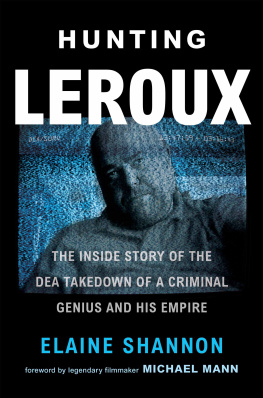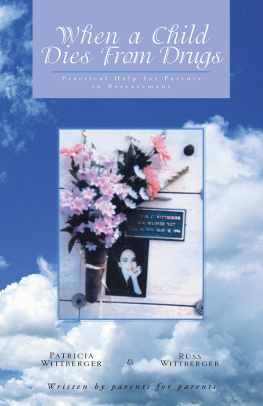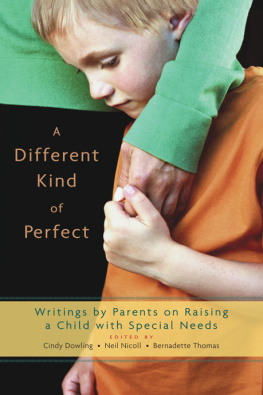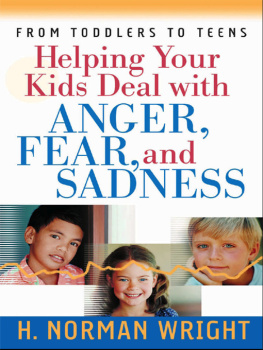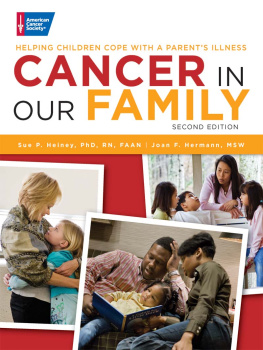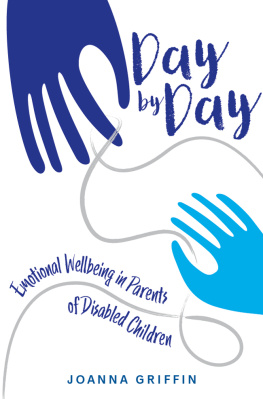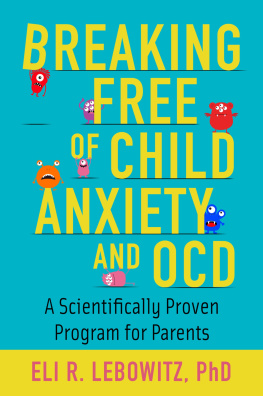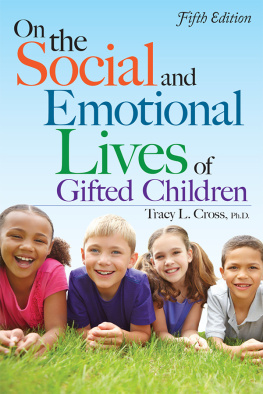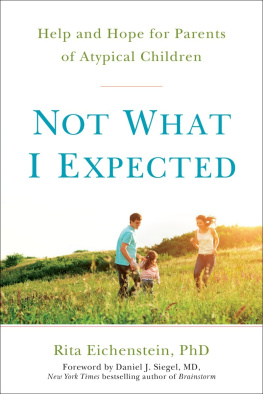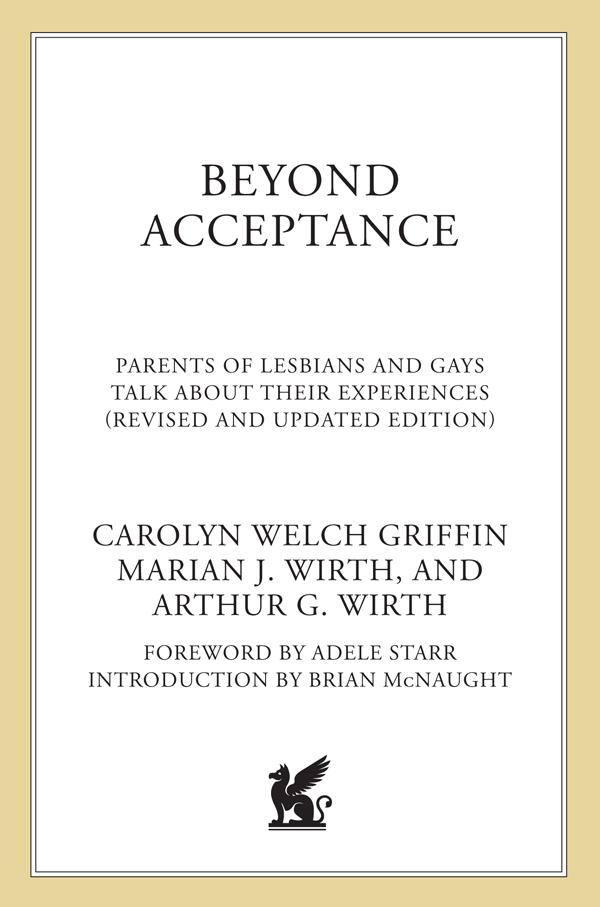Contents
Guide

The author and publisher have provided this e-book to you for your personal use only. You may not make this e-book publicly available in any way. Copyright infringement is against the law. If you believe the copy of this e-book you are reading infringes on the authors copyright, please notify the publisher at: us.macmillanusa.com/piracy.
We were learners. We learned most from our own gay children, our families, and from the parents who let us record their words. Their willingness to share recollections of the journey that took them to acceptance and beyond made it possible for us to bring this book into being.
We wish to acknowledge permission from the following publishers to quote from copyrighted materials cited in the text: Dignity, Inc.; Friends Book Center; The Pilgrim Press; Sage Publications, Inc.; and Redwood Records. We would also like to thank Methodist Bishop Melvin Wheatley (ret.), who permitted us to quote from an address he delivered.
Many people helped and encouraged us in various stages of the writing. We owe a special debt of gratitude to Robin Griffin, who typed endless transcripts of interviews; to Becky Torstrick for her care and accuracy in preparing the final draft of the first edition, and to Jim Thomas for his insightful editorial advice.
We wish to express our thanks to John Pingree for his patience in deciphering our handwriting and for his precision in typing the many drafts of this revised edition.
It is more than twenty years since parents of gay and lesbian children began meeting in groups across the nation. When we first got together, it was for the purpose of bringing support and comfort to one another. We told our family histories and shared our feelings and experiences. What evolved was the realization that our gay sons and lesbian daughters were not a problem; that the problem was a very misinformed society.
Our observations have helped us to understand gay persons. We have learned that for up to 10 percent of the population it is natural to be attracted to the same sex; that there really is no choice in ones sexuality; and that there is no pattern to the kind of family that has a gay child. The love we had for our children sustained us while we learned.
Today there are more than four hundred parent groups and affiliates in the United States plus another ten in foreign countries. And more are in formation. Because our children are victims of a great deal of misinformation, we are trying to change attitudes toward them by speaking out and by sharing with youour community-at-largewhat we have learned.
This is what the authors of Beyond Acceptance have accomplished. They have invited you into their lives through interviews with parents and others in their local parent group, through their rap and discussion meetings, and by sharing their thoughts and experiences. They have written about their group so you can observe the stages that so many of us parents have gone through.
Each parent group is unique, yet each is the same. The group represented in this book is in the heartland of America. It speaks for all of us. It gets to the heart of the parents movement.
When I first became involved twenty years ago, I had hopes that we would put ourselves out of business in a few years. It is still my hope, but as long as we are needed we will be available. Thats for sure!
Adele Starr, Past President
Parents, Families and Friends
of Lesbians and Gays (National)
E DITORS N OTE : Jeanne and Jules Manford started the first group of Parents, Families and Friends of Lesbians and Gays (Parents FLAG or P-FLAG) in 1973 in New York City. Adele and Larry Starr and colleagues started the Los Angeles group in 1976. Adele Starr was the first president of the national P-FLAG, which incorporated in 1981. Her term as president ran from 1981 to 1987.
For New Years Eve, 1990, my partner, Ray, and I flew to Sarasota for what we knew would be Moms last holiday celebration. There we joined the folks in the ritual of watching the televised descent of the ball in Times Square and we greeted the new year with cheers, hugs, and kisses.
Mom died of cancer the following spring. Dad followed her four years later after suffering a heart attack. And though I miss them both enormously, I live without doubt that they both loved me and were very proud of me. Sadly, all gay people cannot say the same.
Frequently when I speak publicly about homosexuality, I will notice men and women in the audience crying silently as they hear me say I have no unfinished business with my folks. Afterward they will often identify themselves as either the closeted gay child of a parent who has died or the parent of a deceased gay child who never heard their parent say, I love you just the way you are.
This wonderful book is designed to eliminate such tears of regret. It belongs in the hands of every parent, family member, and friend who knows or suspects someone they love is gay and in the hands of every gay person who is about to share his or her beautiful though often unsettling secret. Beyond Acceptance, now updated to reflect important breakthroughs in science and in public perceptions, provides a clear and reliable road map for those who seek mutual understanding and respect between straight parents and gay children.
I wish my folks had had access to this book in 1974. Though they ultimately made it through the journey, Beyond Acceptance would have comforted them early in the process by affirming their feelings. It would have answered their many questions with an authority I could not have, and led them patiently, gently, and safely to new levels of understanding and perhaps involvement.
When I came out to them at age twenty-six, my dear mother wept out of fear of what the world would do to me and out of shame that she had failed. Dads approach was more hopeful. He assured me that I had a hormone imbalance I would outgrow. Regrettably, they had to struggle with their feelings in a vacuum, void of peer support or accurate information. The same would not be true today.
As I read these poignant reflections by the parents of other gay people, I hear Mom and Dad as they might have sounded confiding to a friend. Their initial fear, hurt, denial, anger, alienation, and shame, among other feelings, are all here. One of the great strengths of this book is its testimonies by real people who have made the journey through these emotions. Parents of gay people who are confused and in pain will be comforted and encouraged by the chats they can have with these anonymous new friends.
Once secure in the assurance they are not alone in their feelings, parents of gay people are then freed to think more clearly about their situation and to seek answers to their many questions. Most parents will be as confused by the subject of homosexuality as gay people are initially. That lack of familiarity with the topic often leads to fear. And, as most people would agree, the best antidote to fear is factual information and exposure.
Beyond Acceptance does a fine job in presenting accurate information about homosexuality, addressing such concerns as Is it a choice? and Can it be changed? Readers will find all of their questions answered or will be referred to an extensive list of reliable resources.
Beyond the facts, what separates this book from others with the same message is the unique voice of the messenger. Though my parents respected me, it was far more effective for them to eventually hear from a heterosexual peer than from me that I made no choice in being gay. In these pages, heterosexual parents share with other heterosexual parents information they found trustworthy and helpful.





